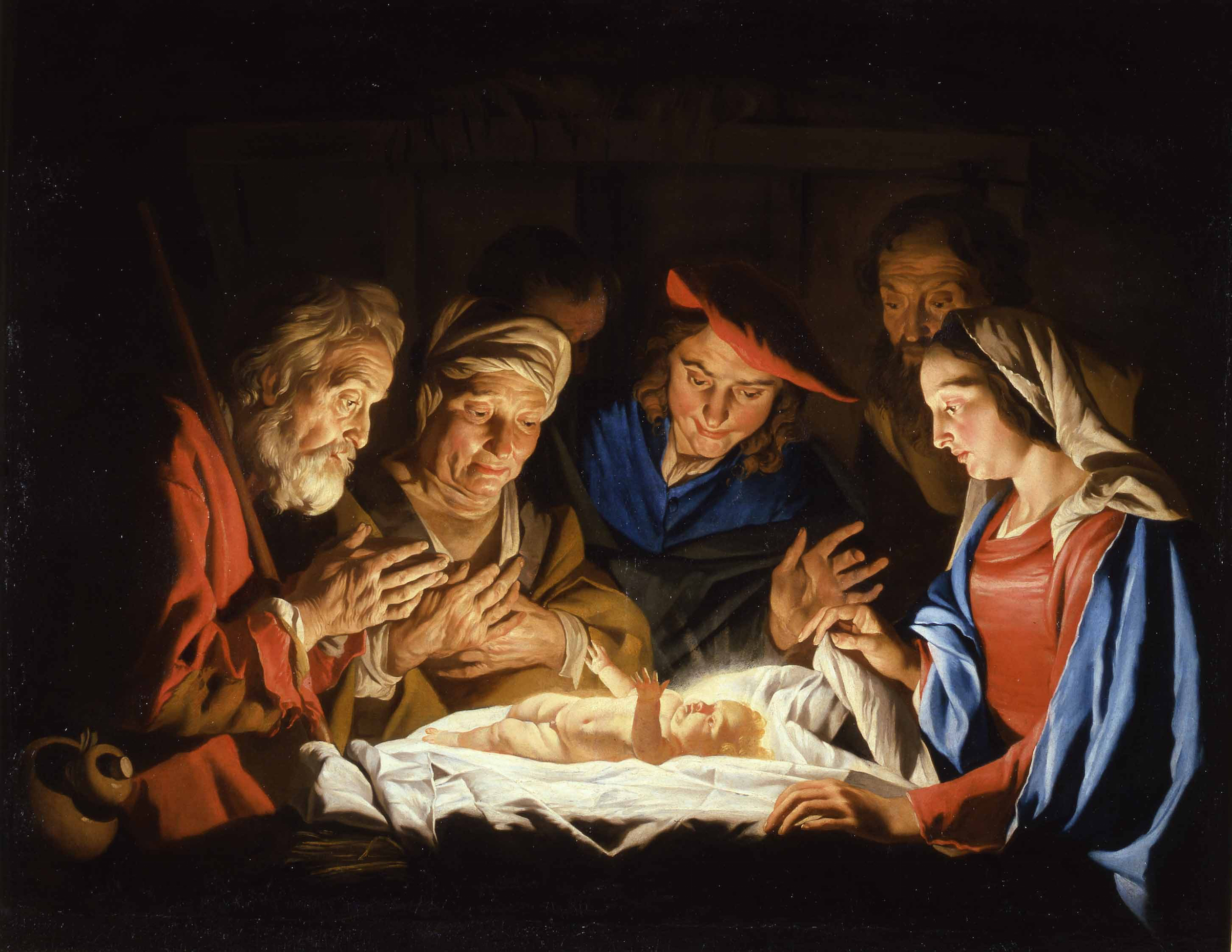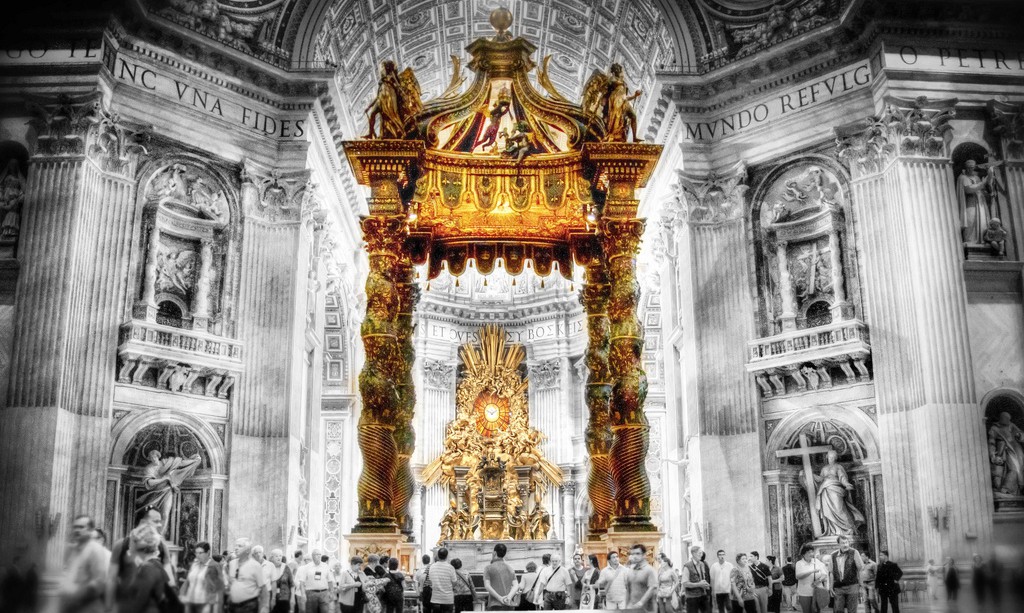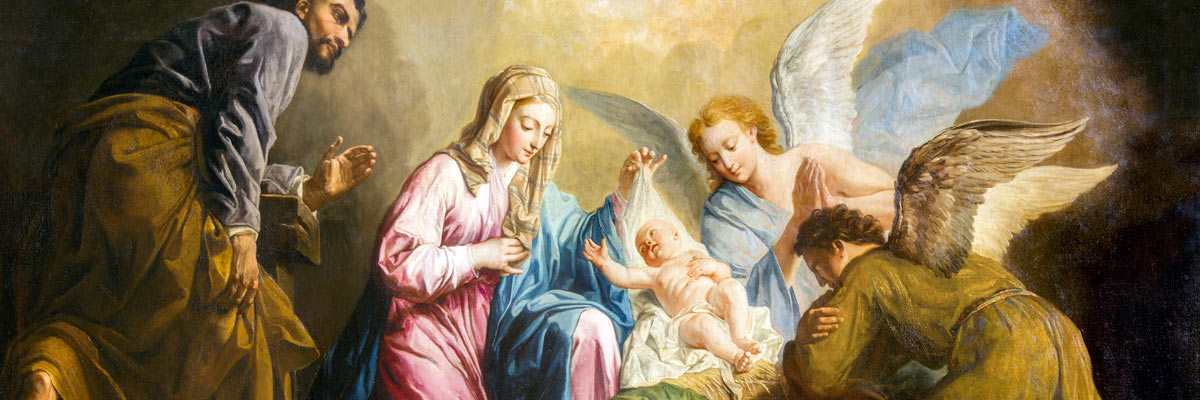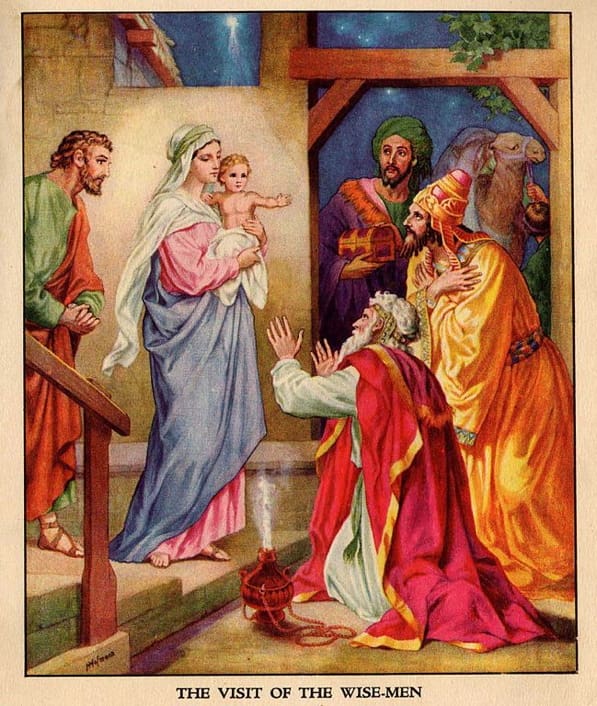The following is a meditation on the Circumcision by Fr. Prosper Gueranger. A very blessed, happy and prosperous New Year 2016 to all of my readers and followers.
Our new-born King and Saviour is eight days old today; the Star, that guides the Magi, is advancing towards Bethlehem, and, five days hence, will be standing over the Stable where our Jesus is being nursed by his Mother. Today, the Son of Man is to be circumcised; this first sacrifice of his innocent Flesh must honour the eighth day of his mortal life. Today, also, a Name is to be given him–the Name will be Jesus, and it means Saviour. So that, Mysteries abound on this day: let us not pass one of them over, but honour them with all possible devotion and love.
But this Day is not exclusively devoted to the Circumcision of Jesus. The mystery of this Circumcision forms part of that other great mystery, the Incarnation and Infancy of our Saviour–a mystery on which the Church fixes her heart, not only during this Octave, but during the whole forty days of Christmas-Tide. Then, as regards our Lord’s receiving the Name of Jesus, a special Feast, which we shall soon be keeping, is set apart in honour of it. There is another object, that shares the love and devotion of the Faithful, on this great Solemnity. This object is Mary, the Mother of God. The Church celebrates, today, the august prerogative of this divine Maternity, which was conferred on a mere creature, and which made her the co-operatrix with Jesus in the great work of man’s salvation.
The holy Church of Rome used formerly to say two Masses on the first of January; one was for the Octave of Christmas Day, the other was in honour of Mary. She now unites the two intentions in one Sacrifice, in the same manner as, in the rest of this Day’s Office, she unites together the acts of her adoration of the Son, and the expressions of her admiration for, and confidence in, the Mother.
But it is today, that we, the children of the Roman Church, must pour forth all the love of our hearts for the Virgin-Mother, and rejoice with her in the exceeding happiness she feels at having given birth to her and our Lord. During Advent, we contemplated her as pregnant with the world’s salvation; we proclaimed the glory of that Ark of the New Covenant, whose chaste womb was the earthly paradise, chosen by the King of Ages for his dwelling-place. Now, she has brought him forth, the Infant-God; she adores him, Him who is her Son. She has the right to call him, her Child; and He, God as He is, calls her in strictest truth, His Mother.
Let us not be surprised, therefore, at the enthusiasm and profound respect, wherewith the Church extols the Blessed Virgin, and her prerogatives. Let us, on the contrary, be convinced, that all the praise the Church can give her, and all the devotion she can ever bear towards her, are far below what is due to her as Mother of the Incarnate God. No mortal will ever be able to describe, or even comprehend, how great a glory accrues to her from this sublime dignity. For, as the glory of Mary comes from her being the Mother of God, one would have first to comprehend God Himself, in order to measure the greatness of her dignity. It is to God, that Mary gave our human nature; it is God, whom she had as her Child; it is God, who gloried in rendering Himself, inasmuch as He is Man, subject to her: hence, the true value of such a dignity, possessed by a mere creature, can only be appreciated, in proportion to our knowledge of the sovereign perfections of the great God, who thus deigns to make Himself dependent upon that favoured creature. Let us, therefore, bow down in deepest adoration before the Majesty of our God; let us, therefore, acknowledge that we cannot respect, as it deserves, the extraordinary dignity of Her, whom He chose for His Mother.
The same sublime Mystery overpowers the mind from another point of view–what were the feelings of such a Mother towards such a Son? The Child she holds in her arms, and presses to her heart, is the Fruit of her virginal womb, and she loves Him as her own; she loves Him because she is His Mother, and a Mother loves her child as herself, nay, more than herself:–but, when she thinks upon the infinite majesty of Him, who has thus given Himself to her to be the object of her love and her fond caresses–she trembles in her humility, and her soul has to turn, in order to bear up against the overwhelming truth, to the other thought of the nine months she held this Babe in her womb, and of the filial smile he gave her when her eyes first met His. These two deep-rooted feelings–of a creature that adores, and of a Mother that loves–are in Mary’s heart. The being Mother of God implies all this:–and may we not well say, that no pure creature could be exalted more than she? and that in order to comprehend her dignity, we should first have to comprehend God Himself? and that only God’s infinite wisdom could plan such a work, and only His infinite power accomplish it?
A Mother of God!–It is the mystery, whose fulfilment the world, without knowing it, was awaiting for four thousand years. It is the work, which, in God’s eyes, was incomparably greater than that of the creation of a million new worlds, for such a creation would cost Him nothing; he has but to speak, and all whatsoever he wills is made. But, that a creature should become Mother of God, He has had, not only to suspend the laws of nature by making a Virgin Mother, but also to put Himself in a state of dependence upon the happy creature He chose for His Mother. He had to give her rights over himself, and contract the obligation of certain duties towards her. He had to make Her His Mother, and Himself her Son.
It follows from all this, that the blessings of the Incarnation, for which we are indebted to the love wherewith the Divine Word loved us, may and ought to be referred, though in an inferior degree, to Mary herself. If she be the Mother of God, it is because she consented to it, for God vouchsafed, not only to ask her consent, but, moreover, to make the coming of His Son into this world depend upon her giving it. As this His Son, the Eternal Word, spoke His Fiat over chaos, and the answer to His word was creation; so did Mary use the same word Fiat:–let it be done unto me (St. Luke, i. 38), she said. God heard her word, and, immediately, the Son of God descended into her virginal womb. After God, then, it is to Mary, His ever Blessed Mother, that we are indebted for our Emmanuel.
The divine plan for the world’s salvation included there being a Mother of God: and as heresy sought to deny the mystery of the Incarnation, it equally sought to deny the glorious prerogative of Mary. Nestorius asserted, that Jesus was only man; Mary, consequently was not Mother of God, but merely Mother of a Man, called Jesus. This impious doctrine roused the indignation of the Catholic world. The East and West united in proclaiming, that Jesus was God and Man, in unity of Person; and that Mary, being His Mother, was, in strict truth, “Mother of God.” This victory over Nestorianism was won at the Council of Ephesus. It was hailed by the Christians of those times with an enthusiasm of faith, which not only proved the tender love they had for the Mother of Jesus, but was sure to result in the setting up of some solemn trophy, that would perpetuate the memory of the victory. It was then that began, in both the Greek and Latin Churches, the pious custom of uniting, during Christmas, the veneration due to the Mother with the supreme worship given to the Son. The day assigned for the united commemoration varied in the several countries, but the sentiment of religion, which suggested the Feast, was one and the same throughout the entire Church.
At that time : After eight days were accomplished, that the Child should be circumcised, His name was called Jesus, which was called by the Angel, before He was conceived in the womb.
The Child is circumcised: He is, now, not only a member of the human race; He is made, today, a member of God’s chosen People. He subjects Himself to this painful ceremony, to this symbol of one devoted to the Divine service, in order that He may fulfil all justice. He receives, at the same time, His Name:–the Name is Jesus, and it means a Saviour. A Saviour! Then, He is to save us? Yes; and He is to save us by His Blood. Such is the divine appointment, and he has bowed down his will to it. The Incarnate Word is upon the earth in order to offer a Sacrifice, and the Sacrifice is begun today. This first shedding of the Blood of the Man-God was sufficient to the fulness and perfection of a Sacrifice; but He is come to win the heart of the sinner, and that heart is so hard, that all the streams of that Precious Blood, which flow from the Cross on Calvary, will scarcely make it yield. The drops that were shed today would have been enough to satisfy the justice of the Eternal Father, but not to cure man’s miseries, and the Babe’s Heart would not be satisfied to leave us uncured. He came for man’s sake, and His love for man will go to what looks like excess–He will carry out the whole meaning of His dear name–He will be our “Jesus,” our Saviour.
On this the Eighth Day since the Birth of our Emmanuel, let us consider the great mystery which the Gospel tells us was accomplished in his divine Flesh–the Circumcision. On this day, the earth sees the first-fruits of that Blood-shedding, which is to be its Redemption, and the first sufferings of that Divine Lamb, who is to atone for our sins. Let us compassionate our sweet Jesus, who meekly submits to the knife which is to put upon Him the sign of a Servant of God.
Mary, who has watched over Him with the most affectionate solicitude, has felt her heart sink within her, as each day brought her nearer to this hour of her Child’s first suffering. She knows, that the justice of God does not necessarily require this first sacrifice, or might accept it, on account of its infinite value, for the world’s salvation: and yet, the innocent Flesh of her Son must, even so early as this, be torn, and his Blood flow down his infant limbs.
What must be her affliction at seeing the preparations for this painful ceremony! She cannot leave her Jesus–and yet, how shall she bear to see Him writhe under this His first experience of suffering! She must stay, then, and hear His sobs and heartrending cries; she must bear the sight of the tears of her Divine Babe, forced from Him by the violence of the pain. We need St. Bonaventure to describe this wonderful mystery. “And if He weeps, thinkest thou his Mother could keep in her tears? No–she, too, wept, and when the Babe, who was standing on her lap, perceived her tears, He raised His little hand to her mouth and face, as though he would beckon to her not to weep, for it grieved Him to see Her weeping, whom He so tenderly loved. The Mother, on her side, was touched to the quick at the suffering and tears of the Babe, and she consoled Him by caresses and fond words; and as she was quick to see His thoughts, as though He had expressed them in words, she said to Him: If thou wishest me to cease weeping, weep not Thou, my Child! If Thou weepest, I must weep too. Then the Babe, from compassion for the Mother, repressed his sobs, and Mary wiped His eyes and her own, and put His Face to her own, and gave Him her Breast, and consoled him in every way she could (Meditations on the Life of Christ, by St. Bonaventure).”
And now, what shall we give in return to this Saviour of our souls for the Circumcision, which he has deigned to suffer, in order to show us how much He loved us? We must, according to the teaching of the Apostle, circumcise our heart from all its evil affections, its sins, and its wicked inclinations; we must begin, at once, to live that new life, of which the Infant Jesus is the sublime model. Let us thus show Him our compassion for this His earliest suffering for us, and be more attentive, than we have hitherto been, to the example He sets us.










